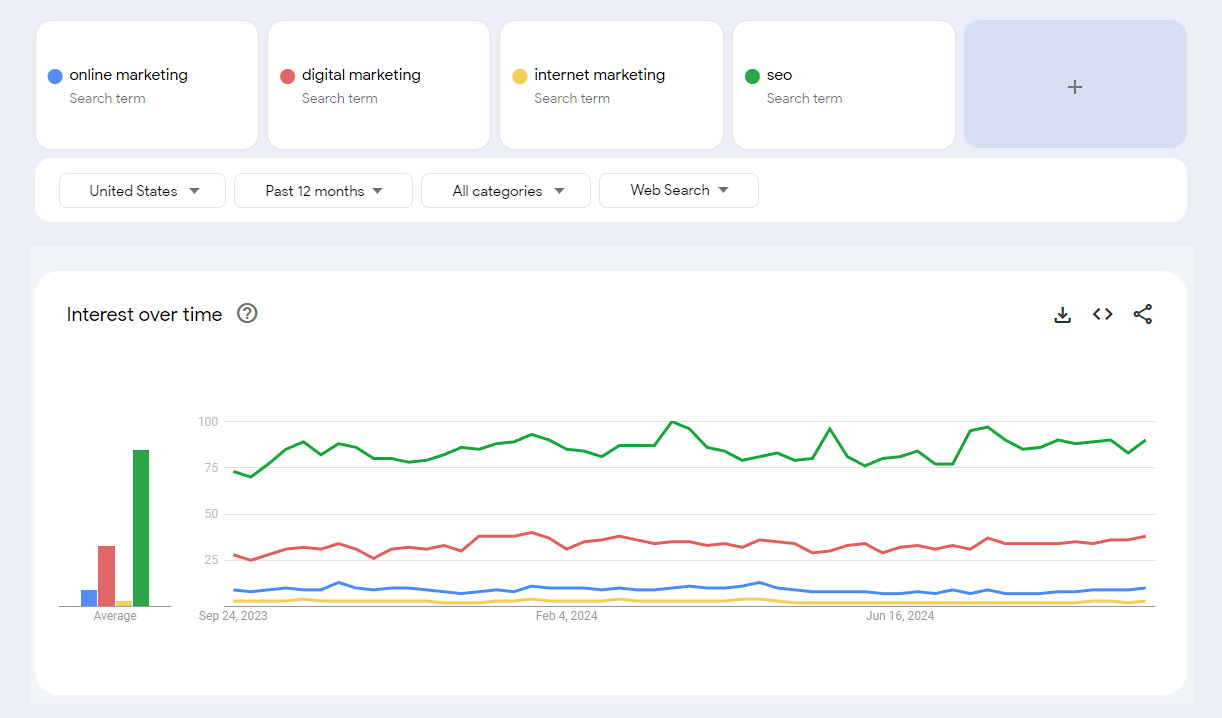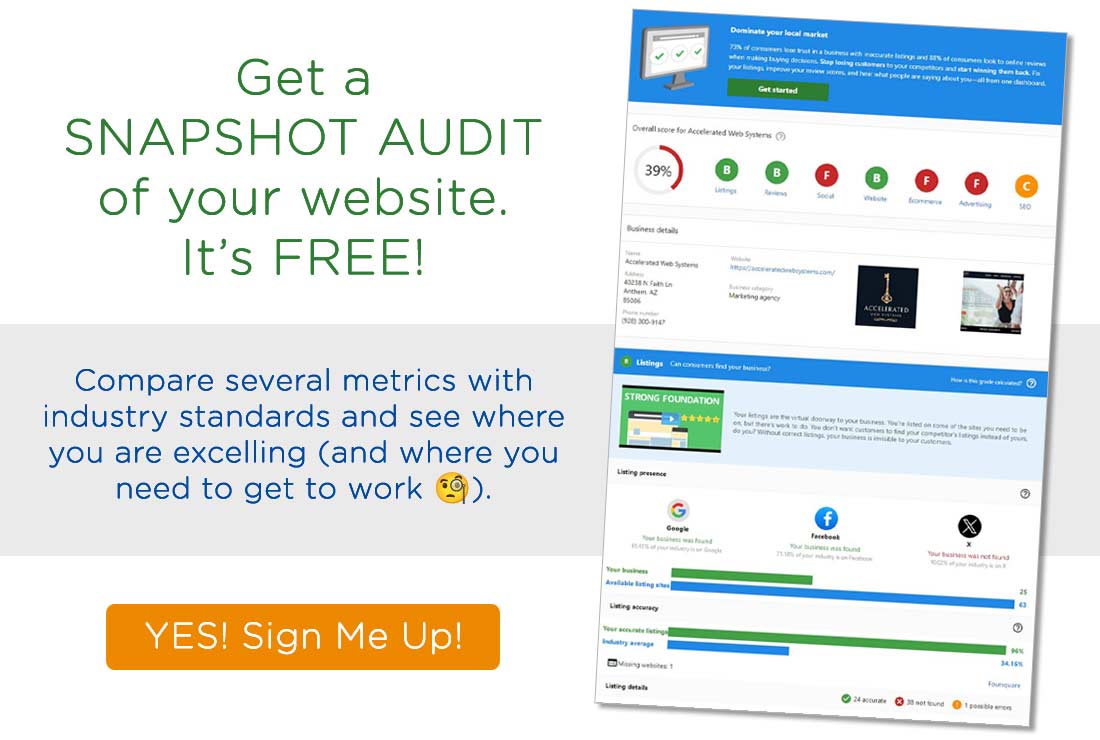Studying Google Keyword Trends is Handy, but it Doesn’t Tell the Whole Story
When determining the best keywords to target for digital marketing campaigns, it’s important to consider several factors beyond mere search volume.
This case study – using Accelerated Web Systems as an example – uses a Google Trends graph to evaluate the popularity of four keywords: “SEO,” “Digital Marketing,” “Internet Marketing,” and “Online Marketing.”
To the layperson, these four phrases can be used interchangeably. So, which one should I choose?
While the chart above provides a useful traffic overview, it doesn’t reveal several important nuances, such as buyer’s intent, locality, difficulty level, and average cost per click (CPC). Understanding these can help craft a more effective keyword strategy.
Analyzing the Google Trends Data
The graph above shows the following search term trends over the past 12 months in the United States:
- SEO (Green Line): This term shows the highest and most consistent interest over time, reflecting its established importance in digital marketing. The fluctuations are relatively stable, indicating steady demand.
- Digital Marketing (Red Line): This keyword also maintains a steady interest, though at a lower level than “SEO.” Its moderate popularity suggests it could be a good complementary keyword for content targeting broader marketing topics.
- Online Marketing (Blue Line) and Internet Marketing (Yellow Line): Both show lower levels of interest compared to “SEO” and “Digital Marketing.” Despite this, their lower popularity could mean less competition, which might be advantageous for a quick ranking boost.
What the Graph Doesn’t Show You
Buyer’s Intent
The chart shows interest levels but doesn’t reflect the user’s intent. For example, someone searching for “SEO” may be looking for information, a definition, services, or even a job in SEO. Understanding this intent is necessary for creating content that converts.
Locality
Geographic variations can dramatically impact keyword strategy. While “SEO” might be a popular global term, the search volume and competitive landscape can vary significantly across cities or regions. For example, targeting localized terms like “SEO services in Phoenix” would be a more practical choice for an agency trying to break into a smaller market.
Difficulty Level
High search volume often correlates with high competition. A keyword like “SEO” will likely be much harder to rank for than “Online Marketing,” but don’t assume this. It’s essential to use tools like Ahrefs or SEMrush to assess the keyword difficulty before choosing a primary focus. Timing is everything. Trying to compete in a saturated market can take years and cost a lot of money.
Doing the research first and interpreting the data properly can help you make informed decisions based on data.
For example, I examined the difficulty level for both “Digital Marketing” and “Online Marketing” and discovered at the time that the difficulty rating for both phrases was the same. So, I chose to target Digital Marketing. I use this phrase on my website and everywhere else on the web probably 10x more than the other phrase. Notice that I emphasized “at the time.” You should perform fresh keyword phrase research regularly to monitor changes in the data.
Average Cost Per Click (CPC)
A high CPC means that the keyword is highly competitive in the advertising space, which is a sign there are paying clients there. Companies would not be paying for top placement if there wasn’t a good return on that investment.
Strategic Recommendations
Target a Mix of High and Low-Competition Keywords
While “SEO” and “Digital Marketing” are excellent high-volume targets, they will take longer to rank for due to their competitive nature. Including lower competition phrases like “Online Marketing” can help capture some quick wins while you build authority for more challenging keywords.
Incorporate Long-Tail Keywords
Long-tail keywords, such as “affordable SEO services for small businesses,” often have lower competition and are more likely to align with buyer’s intent. This strategy can help attract more targeted traffic that is closer to converting.
Focus on Content Clusters
Consider creating a series of interconnected articles that cover a broader topic in-depth. For example, a primary article on “SEO Strategies for 2024” could link to subtopics like “On-Page SEO Tips” or “How to Use Google Analytics for SEO.” This approach helps in ranking for a cluster of related keywords, improving your overall visibility.
Leverage Local SEO
If you serve a specific geographic area, use local keywords in your content. Terms like “best digital marketing agency in Anthem, AZ” are more targeted and can drive relevant traffic that is more likely to convert.
Monitor and Adapt
Trends change, and so should your strategy. Regularly review your analytics and keyword rankings to see what’s working and where there’s room for improvement. Adjust your content and SEO tactics accordingly.
Conclusion
Choosing the right keywords involves more than just looking at search trends. By considering the buyer’s intent, locality, competition, and other factors, you can create a more nuanced and effective SEO strategy. In this case study, “SEO” and “Digital Marketing” emerge as top choices due to their consistent interest, but don’t overlook the potential of less competitive terms like “Online Marketing.” A well-rounded keyword strategy will help you rank faster and achieve better results, making the most of your digital marketing efforts.
Evaluating Keywords for Maximum SEO Impact
Evaluating keyword phrases is a complex but critical part of any successful SEO strategy. The key is to balance the demand (search volume), competition, intent, relevance, locality, brand consideration, and difficulty of each keyword while also keeping an eye on trends.
At the end of the day, effective keyword evaluation ensures that your SEO efforts are aligned with your business goals and tailored to the search behavior of your target audience.
Ready to level up your SEO strategy?
Contact us at Accelerated Web Systems to learn how we can help you elevate your online presence!
Why choose Accelerated Web Systems for SEO?
✔️ We believe in nuance, alignment, and consistent, relentless work. You are not just a number with us.
✔️ We dive deep into your unique business proposition, your ideal client persona, and your revenue goals.
✔️ We evaluate your current situation in the search engines from many angles to establish a benchmark before we start. Keywords, competition, reviews, Google properties, website speed, and website conversion rates all play a part in a successful SEO campaign.
✔️ We research, strategize, plan, and execute for short and long-term success.
✔️ You can count on our SEO services being comprehensive, clever, creative, and competitive.
✔️ We have been doing SEO for over 18 years and web design for over 20. We know what it takes to rank!



